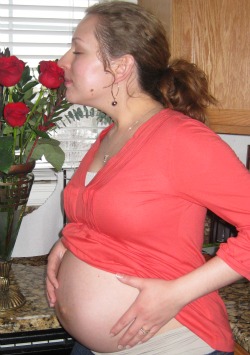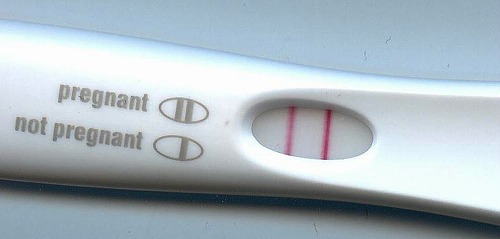Getting Pregnant While Breastfeeding

Getting pregnant while breastfeeding worries every nursing mother to a certain degree. Breastfeeding and pregnancy were created to perfectly co-exist. One doesn’t prohibit the other. However, there are some reasonable considerations that a nursing woman needs to pay attention to.
Breastfeeding has always been the most natural form of contraception. Visit Breastfeeding As Birth Control to read more.
Successful milk production and release are ensured by hormones prolactin and oxytocin. Besides taking care of milk production, prolactin also suppresses production of progesterone and estrogen – ovulation and fertility hormones. It prevents you from getting pregnant while breastfeeding. This is also why nursing women don’t have their period.
By means of exclusive breastfeeding your body protects itself from
becoming pregnant too soon after the delivery.
Important: According to some studies, a woman’s body needs 2 years to fully recover from pregnancy and delivery and to restore itself both nutritiously and physically to be ready for another childbearing. This is exactly the time you need to finish nursing your older child and re-gain your strength.
You most likely heard of cases when breastfeeding women became pregnant. Our bodies react differently to hormonal changes. Our personal physiological characteristics differ, so do our gynecological build-up and pre-conditions.
Using breastfeeding as a contraceptive is called Lactation Amenorrhea Method (LAM) and it gives 98% protection, if the baby is under 6 months old, breastfed on demand day and night, doesn't receive any supplementation and your period is not back. Visit Breastfeeding As Birth Control to read more.
These guidelines have to be followed strictly. Every time a feeding is postponed or supplemented, woman’s fertility is on its way to recovery. If all of these guidelines are followed, you can nurse in peace not worrying about getting pregnant while breastfeeding with 98% certainty. Remaining 2% include women with high hormonal sensitivity.
A Note on Menstruation
Absence of menstruation during the most of your nursing period has long been mistaken for a sign of postpartum infertility. It is not a perfect world, however. Your first period after the delivery does mean that ovulation is back and you can become pregnant. But your fertility may return even prior to it.
It is especially true for women with a long interval between ovulation
and menstruation. When the first ovulation happens, the woman may become
pregnant not knowing that her first postpartum menstruation was on its way. Visit Menstruation After Pregnancy section to read more.
Traditional Contraceptives
When your baby turns 6 months old, his/her nutritional requirements change. Breastfeeding is still an essential part of the diet, but you introduce solids and fluids other than breast milk. Decreased frequency of nursing sessions lowers supply and the amount of prolactin, therefore, boosts fertility.
If you didn’t use any additional methods of contraception up to this point,
it is a good time to talk to your OBGYN about it. You will most likely
be offered two options: hormonal methods (the pill, injected hormones or
intrauterine devices) or non-hormonal methods (condoms, spermicides,
diaphragms). Read about them here.
I exclusively breastfed my son for the first 6 months. However, my doctor put me on the mini-pill. Mini-pills are considered safe during breastfeeding. These are the pills that contain smaller amounts of progestin and don’t contain estrogen. This smaller amount of just one hormone is enough for a breastfeeding woman and doesn’t harm the fetus. It is also supposed to not affect milk supply.
I started the mini-pill 2 months into breastfeeding and was taking it until weaning when my son was 16 months old.
Judging from my experience only and not finding any credible study to prove it, I say that the pill can affect milk supply. My milk supply dropped soon after I started the mini-pill and never fully recovered. However, our breastfeeding journey wasn’t easy and there may have been other factors causing low milk supply. You can read my breastfeeding story here.
How to Facilitate Pregnancy While Breastfeeding

The best way of getting pregnant while breastfeeding is to breastfeed less often starting with night feedings. It will decrease prolactin, which will stop suppressing fertility hormones. Fertility hormones are the most active at night, so dropping night feedings may be enough for ovulation to happen and your period to start.
If your older child is a toddler eating a well-balanced diet and
taking breast milk only occasionally, decreasing the frequency of nursing
sessions is not a problem. In addition, your toddler may become less attracted
to breast due to change in composition and taste of the milk. If you become pregnant, you can still continue breastfeeding while pregnant and then tandem nurse both kids.
If your older child is still a baby in need of breast milk benefits, you may need to consider putting off getting pregnant while breastfeeding. There is a reason why nature set is that way that you are protected from getting pregnant while breastfeeding. Don’t force it.
If I could do over some things I did with my first breastfeeding experience, I would not start the pill so early. I would breastfeed exclusively day and night for the first 6 months without any contraception.
With solids introduction and decreased frequency of feedings I would start the mini-pill and add another non-hormonal method of contraception. Doctors say is it safe to start regular pill (containing progestin and estrogen) when the baby turns 6 months old. But since I know my milk supply is vulnerable, I wouldn’t jeopardize it with a stronger pill.
This is just my experience. Keep in mind, every body is different and reacts differently to hormones. The bottom line is, listen to your instincts and your heart and let your baby lead.
There are many ways to show your love and devotion to your kids and to win their trust. Breastfeeding is the most natural one.
Yours,
Viktoriya
Back to top of Getting Pregnant While Breastfeeding> Breastfeeding While Pregnant>Breastfeeding Home










